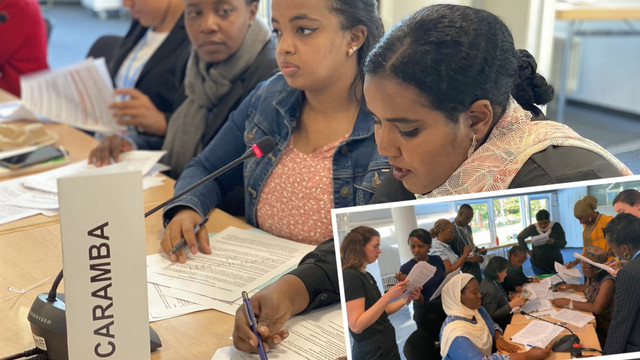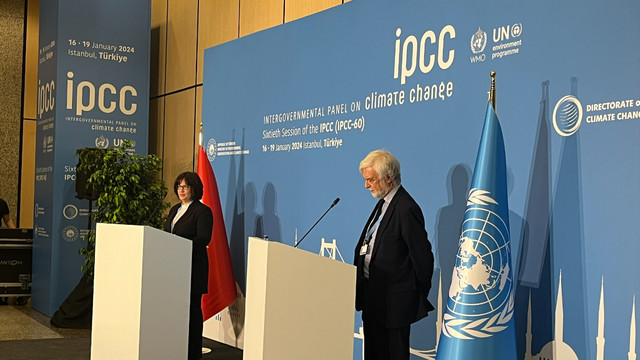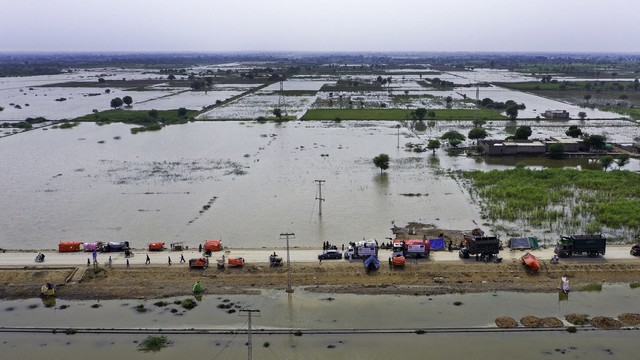Understanding the gender imbalance at the international climate negotiations
Emerging findings of a new study provide insights into the challenges women face in participating in critical UN international climate talks


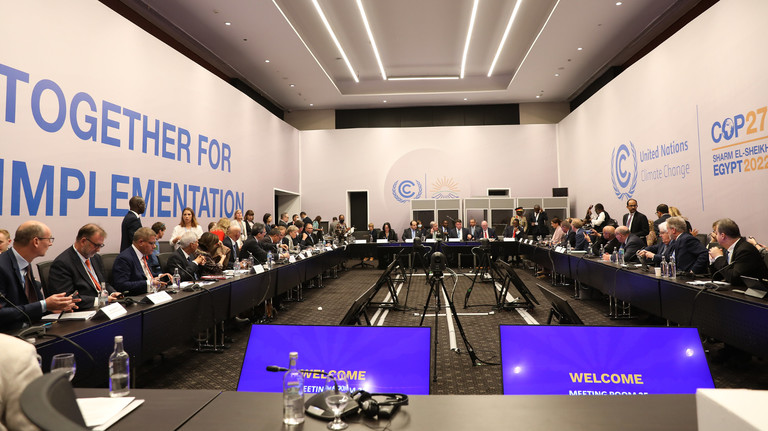
A room full of grey-suited men dominate the negotiations at COP27 in Egypt (Photo: UNclimatechange, via Flickr, CC BY-NC-SA 2.0)
Every year, representatives of almost 200 countries come together under the banner of the United Nations Framework Convention on Climate Change (UNFCCC) to negotiate key decisions and champion ambitious action on climate change. And when wandering the halls of the conference centre at successive Conferences of the Parties (COPs), the diversity is palpable.
Ministers, climate scientists and civil society practitioners flock around colourful country pavilions festooned with flags, and youth activists mingle with women’s association members at oversubscribed side events in windowless rooms along humming corridors.
But in the negotiation rooms, where official party delegates agree positions and negotiating strategies, and where the most critical decisions are made, the gender composition of the conference changes abruptly: far more men than women have a place at the negotiating tables.
Exposing the barriers
So why are women still being held back from participating in international talks on climate?
In a new study, IIED, in partnership with SAEDI Consulting (Barbados) Inc, is taking a closer look at the factors that influence the low participation of women from the least developed countries (LDCs) in the negotiations.
Our study aims to identify and unpack the drivers that result in this gender imbalance within the UNFCCC with a focus on LDCs. To support and guide this research, an advisory group composed of LDC negotiators, experts from the UNFCCC secretariat and LDC civil society organisations (CSOs) will meet periodically to review our findings, provide insights and champion key recommendations within the LDC Group and beyond.
Via a deep dive into the literature, a survey and stakeholder interviews, this study aims to expose the barriers, explore the structural nature of the blockers and highlight good practices that enable women’s meaningful participation and visibility in international climate decision-making spaces.
Key research questions emerging from the literature review informed the stakeholder engagement process (in the form of an online survey) carried out in March. In-depth interviews are being conducted between April and June. SAEDI Consulting’s team is working on the first draft of the research paper which will be discussed with the advisory group in July and August.
Women at recent COPs
With only 37% of women attendees at COP26 in Glasgow forming part of an official national delegation, the UNFCCC’s latest report on gender in the climate change negotiations shows that parity remains a challenge. And figures on women’s roles and engagement during the meetings show that, although they may form part of the delegations, speaking time and decision-making positions are often monopolised by men.
When we go beyond the numbers to examine roles, we see that women often have more administrative and event-related responsibilities than technical ones.
The UNFCCC report reveals that women accounted for only 29% of total speaking time in plenaries at COP26, while WEDO's 2023 Gender Climate Tracker report shows that, despite some fluctuations, the number of women heads of delegation has not improved during the last 10 years, with 21% in 2012 and 20% in 2022.
Gender representation varies by region and country, with women’s participation in delegations from Latin America and Europe usually at 45-50%, compared to 30-35% in African and Asian delegations. In 2020, we published a blog showing that the LDC Group was falling slightly behind on gender parity compared with other negotiating blocs. This correlates with the regional figures, as most LDCs are in Africa and Asia.
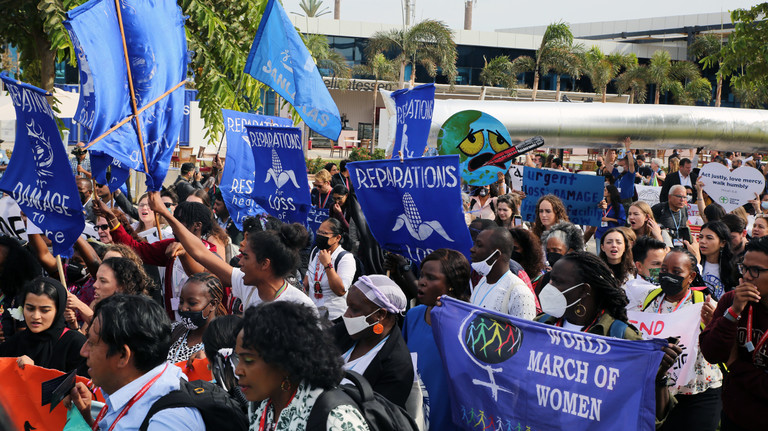
In contrast to the men-led negotiations, women lead a climate protest at Sharm el-Sheikh in Egypt at COP27 (Photo: IISD/ENB)
Why representation matters
Research shows that women in LDCs make up to 60% of the agricultural labour force.
Many women in developing countries have deep connections with ecosystems and nature through their work and daily lives. Relying heavily on water, food, fuelwood and other natural resources for their livelihoods, women often work the land in ecologically diverse and productive smallholdings.
As such, they are impacted first and hardest by climate change and related disasters, as confirmed in the recent IPCC report. Scientists from around the globe also agreed that inclusive gender sensitive governance leads to more effective and sustainable adaptation outcomes, reducing vulnerability and climate risks.
Women working at local and national levels understand why strong outcomes at the climate negotiations are critical and why we need to increase climate ambition, climate finance and climate adaptation. Having more women in decision-making and leadership roles at international level would allow for more integration of gender equality and women’s empowerment into climate decision making processes and solutions as a UNFCCC report showed.
Survey findings
We distributed our survey widely – in English, French and Portuguese – among climate negotiators from the global South, CSOs and the UNFCCC secretariat. The more than 143 responses (almost 40% of whom were female negotiators) provide rich insights into the main challenges women face.
We found that 93% of all respondents believe that more women want to be involved in UNFCCC processes, and 67% of women respondents believe they are not adequately represented. Barriers to women’s participation include time constraints due to other responsibilities, such as childcare, and lack of experience, awareness, support within institutional frameworks and access to finance.
Motivated − but overlooked
But the greatest barrier is that, despite being motivated to participate in the negotiations, women are often overlooked in favour of men when it comes to delegation selection and leadership roles.
And with more men and fewer women in these roles, more training, education and other resources are allocated to men, creating a vicious cycle that leaves women less well equipped to actively participate in climate negotiations. And so, when country delegations are selected, women once again miss out.
Factors related to inadequate representation, summarised by group
Next steps
Once all stages of the research are complete we will take forward recommendations and develop an accompanying action plan geared towards informing policy and practice. This will include practical ways forward to create opportunities for advancing gender equality and increasing women’s participation in future climate negotiations.
The main findings of each phase of our research will be shared via a series of blogs, and the insights from each phase and from the advisory group will inform the final research paper – to be published in February 2024.
We will be on the ground at COP28 in Dubai, presenting the research findings and recommendations to LDC negotiators and other stakeholders with the support of the advisory group members. We will use the results to drive further debate on this issue as well as meaningful change within the negotiations and at country level.
Stay tuned for our updates in the coming months. We would love to hear experiences of women negotiators from LDCs and to integrate these stories into upcoming blogs as well as the final research paper.

